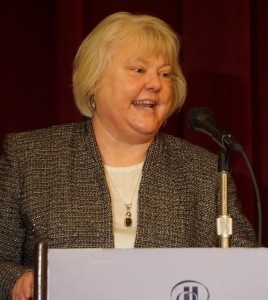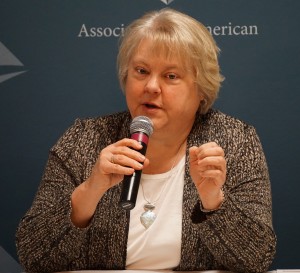
Good afternoon, and thank you for that incredibly warm welcome. Thank you, Blake [Morant]–you have been an amazing president of AALS, and it is an honor to take the handoff from you, my brother of the heart and spirit. I just want to remind you, and Dan [Rodriguez], that you can check out, but you can never leave. Please join me in recognizing and thanking Blake Morant for an amazing term.
Thank you all for being here this afternoon. Before I share a few remarks about the upcoming year, I also want to quickly thank several others, because we are all a product of investment that others make for us: first, my family members who are here today. I also want to say a very deep thanks to three institutions that have been incredibly important to my development as an academic and as a professional. I want to begin with my alma mater Indiana University of Bloomington, a great thanks to all of my faculty there and especially to my friend and mentor Lauren Robel. And of course, I grew up at Seattle University and spent 17 years of my academic career there; it’s been important to my development and I have such high regard for the school and my colleagues there. I also want to say a deep thank you to the University of Washington. I cannot tell you how much I have enjoyed being there, and how much respect I have for the school’s traditions and innovations, so please join me in recognizing both Seattle University and University of Washington.
I also want to thank AALS, including the other members of the executive committee with who I’ve so enjoyed serving; our inspirational director, Judy Areen; and all of the hardworking AALS staff, especially Tracie Thomas and Mary Cullen, who have organized this meeting; what a great job they’ve done. Together, we are striving to enhance AALS leadership to better serve our member schools and to more forcefully and more effectively advocate for legal education. We respect and value our member schools’ diverse missions and diverse goals. When you thrive, we thrive. Our present aim is to redouble our efforts to be of service to you. Not to tell you what to do, nor how to do it, but to support what you do so well and what we respect you so much for. We want to be a leading voice on your behalf, on behalf of legal education, both on our own but also in collaboration and working effectively to find synergies among the many other organizations that also are important to legal education. I think it’s one of those instances where if we can bond together, we can accomplish so much more and we are striving to do that.
As we look forward to the year ahead, I have selected a theme that I hope will be inspiring to our member schools and one that will help AALS continue our advocacy for law and for legal education. That theme is “why law matters.” It is a theme designed to bring out the best of the academy, to turn our vision outward to the world we serve, and to explore–at a fundamental level—why what we do matters in meeting all of the challenges of our current social environment.
Please permit me a few minutes to share a bit about my motivation for this theme and to make three quick points about my hopes for it over the course of the coming year.
As to the motivation for the theme of “why law matters,” in my view, the role of law in society is insufficiently understood or appreciated, and that gap is a harmful one. After over 12 years as a dean and more than 20 as a professor, I am still surprised by how hard it often is for even incredibly smart people to understand the importance of the rule of law to how the world works—or maybe more importantly, how the world may not work so well. From students to the general public, to university presidents and provosts, to leaders of major foundations, law is often seen too narrowly, in my view, as only a system of dispute resolution rather than in its broader role of creating what I call the ecosystem for human flourishing. I suppose that in this broader sense, law is like the air we breathe—perhaps noticed most by its absence rather than by its presence. But we can no more live healthy lives without the rule of law in this world than we can live without air. And waiting to appreciate its vital role until we are choking and gasping is not a good strategy.
Rather, we need to make our case now for why law matters and the academy’s vital role in advancing respect for and understanding of the rule of law. In a 1974 article that was called “Legal Education and the Rule of Law,” John Cribbet, who was at the time an AALS Executive Committee member and also Dean of the University of Illinois College of Law called this the “silent raison d’etre of legal education and the lasting claim for public and private support of the law schools.” Making our case is both urgent and important. In this age of information overload and soundbite reliance, we cannot assume that a concept as complex as law will be understood and appreciated without our sustained efforts. That is especially true in the current environment, I believe, where many aspects of law are troubled and vividly troubled: race-based violence and racial inequity in our criminal justice system; growing access to justice gaps as economic inequality widens; honest businesses struggling to compete against countries that do not value law and justice; deepening ethnic and religious conflicts and resulting migration surges; devastating gun violence expanding in number and in scope; the list could go on and on.
Let’s be honest, the public views law either as a shield that protects the rich, especially if the rich are white and perhaps also male, or as a sword that cuts down the poor, especially if the poor are also black or undocumented. We must acknowledge this public view while also knowing—and critically knowing and helping others to know—that adherence to, not rejection of, the rule of law will help us with these conflicts and more. We have a good case to make that law matters and it is time, maybe past time, that we made it.

I’d also like to share three quick hopes about my theme of why law matters:
My first hope is that we can engage this theme together throughout this year, not just at the AALS Annual Meeting next January in San Francisco. Certainly for that meeting I will be seeking your ideas for plenaries and other programs that engage this theme. But I also hope that many schools will make this theme an explicit part of the day-to-day life of the law school; many of you do this already, and we want to help promote your work at AALS. And if there are ways that I and the other Executive Committee members can be a part of programs you plan, activities that you want to plan, or events you host, please let us know. We want to be engaged with you in that way. Again, we seek to be effective partners with and advocates for our members. We are going to be looking to tell our collective story in ever more effective ways.
My second hope is that this theme will bring us together, both across the academy and also more broadly across the profession. For better or worse, we are certainly “all in this together” in every way. I am a true believer in inclusion and diversity. What that means for me is that I do not support replacing one form of orthodoxy with another; rather, I believe we are at our best when we seek to value the dignity of every person and to create a climate where difference is valued and inclusion is practiced and prioritized. We should all care about law and justice and engage in robust dialogue about why law matters so much. And, as important as legal education is to that question of “why law matters,” so is the bench and bar, so are policy makers and so is the public. Let us seek to practice inclusion in that regard as well and to build more bridges across our profession. Let us model the kind of civic community and respectful debate that our world both needs and craves.
My third hope is that this theme can make a difference, that it will have actual impact and effect—to us, to our profession, to our communities, and to our world. Perhaps it can help us jettison some of the old tropes of law, for instance, those of law being an “obstruction” or law being just a “cost” that may be limiting to what we can accomplish. Perhaps it can help us understand law in new ways and help us appreciate again some of the historic strengths of law, perhaps applied to new contexts—as for example, law as an important stabilizing force in what is clearly a “disruptive” age. Perhaps a more intentional focus on why law matters will help us to re-energize our teaching, our research, and service and inspire a new generation of students to dedicate their lives to the law. Perhaps we can be stirred, not shaken, to press on across challenging terrain, to be what we are made for: the part of the profession with the privilege and the duty to take the long view, holding in trust for past, present, and future generations the promise of equal justice under law.
In closing, please do not misunderstand me in making “why law matters” my theme. I do not ignore, for instance, Grant Gilmore’s provocative point that if law is viewed too narrowly as only focused on process, then in hell there is nothing but law and due process meticulously observed. Neither do I ignore his prior point that if everyone were peaceful and just, we would have little need for law. But we all know we do not live in such a world. The world we live in is both beautiful and broken, and in that world, law may not be the only pathway to justice, but I believe it remains the most promising one that’s within our grasp. You will all have different views about what justice means to you and different views about how to reach it and what pathway we should pursue; I celebrate those diverse viewpoints and I thank you for joining me in this vital task.
I hope you enjoy the rest of the conference, and have enjoyed the part that you’ve been through so far, and I look forward to working with all of you—everyone in the legal academy throughout this coming year and beyond—to make the promise of equal justice under law real. Thank you.